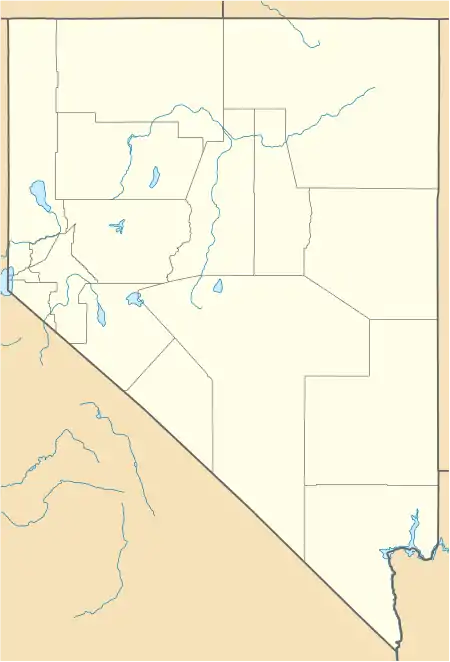Mahogany Fire
The Mahogany Fire was a wildfire that burned on Mount Charleston in the Spring Mountains National Recreation Area, approximately 50 miles northwest of Las Vegas, Nevada in the United States. The fire was first reported on June 28, 2020. The fire burned a total of 2,758 acres (1,116 ha) and was contained on July 7, 2020. The cause of the fire remains under investigation. The fire impacted recreational activities and roadways in the area, including closing a children's summer camp and evacuating Lee Canyon. Additionally, three state highways were closed in the area to allow ease of access for crews and to limit the public's access to the fire area.
| Mahogany Fire | |
|---|---|
 The Mahogany Fire on June 29, 2020 | |
| Location | Spring Mountains National Recreation Area, Nevada, United States |
| Coordinates | 36.306°N 115.618°W |
| Statistics[1] | |
| Date(s) | June 28, 2020–July 7, 2020 |
| Burned area | 2,758 acres (1,116 ha) |
| Cause | Under investigation (human caused) |
| Map | |
 Location in Nevada | |
Events
The Mahogany Fire was first reported on June 28, 2020, around 2:30 PM near the Mahogany Grove Campground on Mount Charleston in the Spring Mountains National Recreation Area, approximately 50 miles northeast of Las Vegas, Nevada.[1][2][3] Upon immediate investigation, incident crews reported it as being 15 acres (6 ha). The fire grew quickly, fueled by pinyon-juniper and brush, moving eastward and growing to an estimated 5,000 acres (2,023 ha). Spring Mountain Youth Camp was evacuated and by 7:15 PM mandatory evacuations were put in place for Lee Canyon.[1][3] S.R. 156, S.R. 157 and S.R. 158 were closed.[4] An evacuation center was established by the American Red Cross at James H. Bilbray Elementary School in Las Vegas, however it closed by the afternoon of June 29.[2][5] Power lines on Mount Charleston were de-energized by NV Energy, impacting 450 customers. An air quality alert was issued for the Las Vegas Valley.[3]
Air support was brought in to fight the fire the next day, June 29. Updated mapping led to the actual acreage to be 3,040 acres (1,230 ha).[1] Due to the rapid growth of the fire, fire crews asked the public to avoid Lee Canyon and Kyle Canyon. While the cause of the fire remains under investigation, the United States Forest Service shared that it was likely human caused.[3] Mapping was once more updated and as of the morning of June 30, 2020, the footprint of the Mahogany Fire was lowered to 2,794 acres (1,131 ha). Highway 156 and 157 were re-opened.[6]
July
On July 2, Highway 156 was closed at the intersection of Highway 158 to allow crews to cut hazardous trees and helicopters to work in the area.[1] Helicopters sourced water from the Lee Canyon resort.[7] Crews continued clean up work, including mopping up hot spots and completing handlines. Starting the week of July 6, Spring Mountain Youth Camp was reopened. Highway 156 beyond the Highway 158 interchange reopened on July 7.[1] The fire was contained on July 7. It burned a total of 2,758 acres (1,116 ha).[1]
Impact

The Mahogany Fire impacted recreational activities in the Spring Mountains National Recreation Area. Spring Mountain Youth Camp was the first site evacuated, reopening for re-population on July 6.[1] The fire caused the evacuation of Lee Canyon, a ski resort. People were allowed to return to Lee Canyon in the evening. However, fire officials asked members of the public to avoid Lee Canyon and Kyle Canyon during the duration of the fire.[1][2][3]
Highway 156, Highway 157 and Highway 158, were closed on June 29. Highway 156 & 157 re-opened the following day.[4] However, Highway 156 was closed again to allow crews to safely work in the area, reopening July 7.[1] Power was turned off for 450 residents in the area from June 28 through June 29.[3]
Air quality was negatively affected in the Las Vegas Valley.[3]
Investigation
While the cause of the Mahogany Fire remains under investigation, the fire was human caused.[7]
Gallery
 Helicopter dropping water near Angel Peak on July 1
Helicopter dropping water near Angel Peak on July 1 Hot shot trucks on July 1
Hot shot trucks on July 1 Fire on June 29
Fire on June 29 Fire on June 28
Fire on June 28 Fire retardant lines protecting power lines near Angel Mountain on July 1
Fire retardant lines protecting power lines near Angel Mountain on July 1
References
![]() This article incorporates public domain material from websites or documents of the United States Forest Service.
This article incorporates public domain material from websites or documents of the United States Forest Service.
- "Mahogany Fire Information - InciWeb the Incident Information System". InciWeb. Retrieved 29 June 2020.
- "Mahogany and Wallace Fires Burning on the SMNRA - InciWeb the Incident Information System". InciWeb. 29 June 2020. Retrieved 29 June 2020.
- DeSilva, Kristen (29 June 2020). "Mahogany Fire: Crews battle 3,040-acre blaze on Mt. Charleston". FOX5 Las Vegas. Retrieved 29 June 2020.
- Moyer, Phillip (29 June 2020). "Kyle Canyon and Lee Canyon Roads reopen, Deer Creek Road remains closed due to wildfire". KSNV. Retrieved 29 June 2020.
- Nash, Rocky (29 June 2020). "Red Cross of Southern Nevada closes evacuation center set up to assist Mt. Charleston residents affected by Mahogany Fire". KLAS. Retrieved 29 June 2020.
- "Mahogany Fire Update 6/30/20 9:00 PM - InciWeb the Incident Information System". InciWeb. Retrieved 2 July 2020.
- Drummond, Cristen (1 July 2020). "US Forest Service: Mahogany Fire near Mt. Charleston human caused". KLAS. Retrieved 2 July 2020.